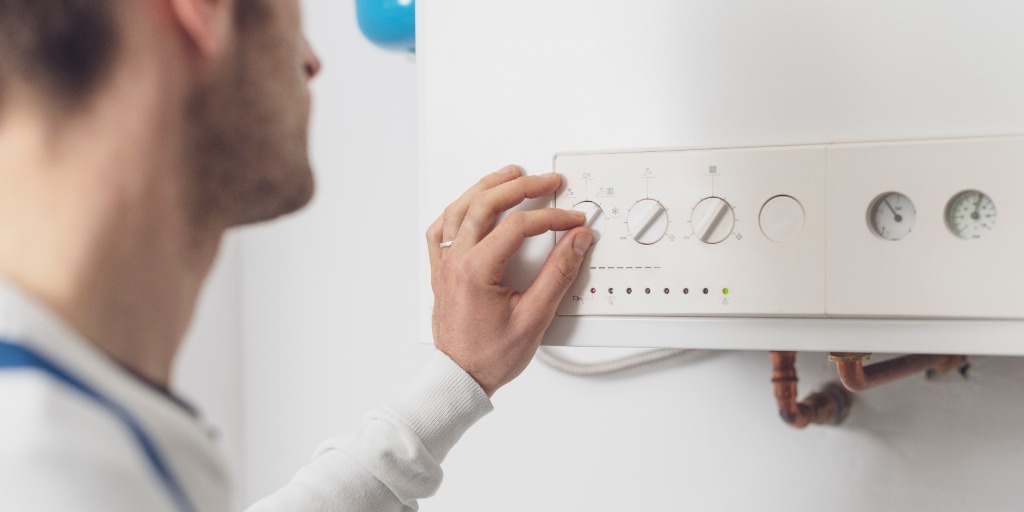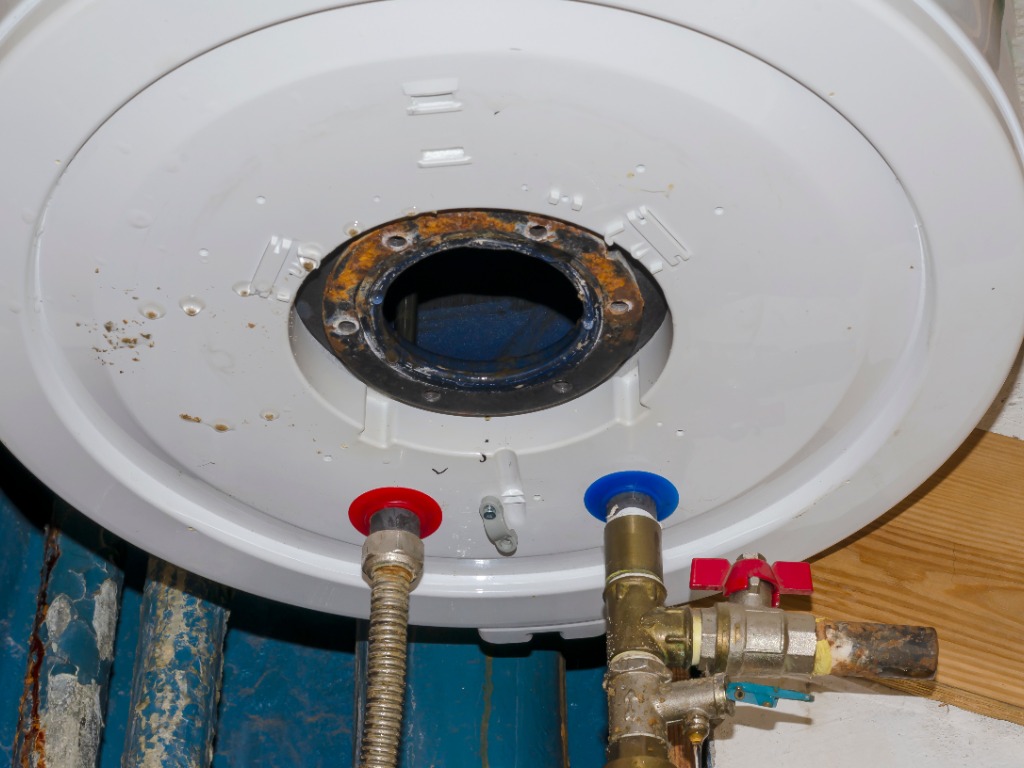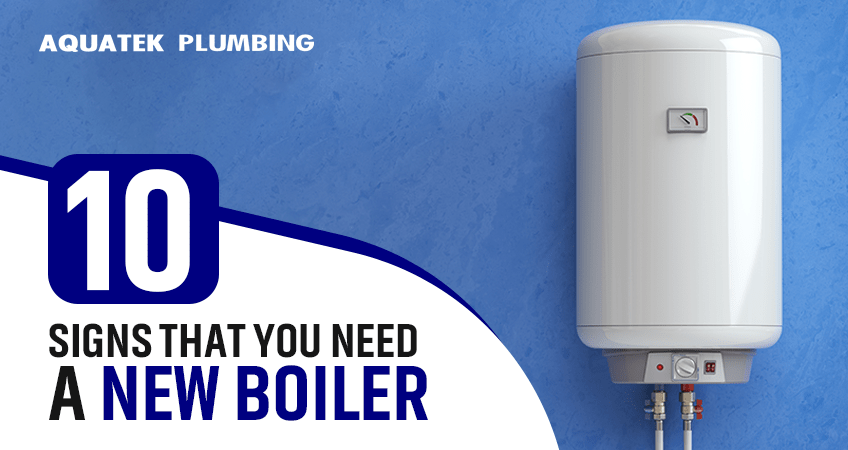Within your central heating system, boilers play a crucial role in keeping our homes warm and comfortable, especially during the cold winter months. However, like all appliances, a gas boiler will have a finite lifespan and eventually need replacing.
It can sometimes be difficult to determine if your boiler just needs a minor repair or if it’s time for a complete boiler replacement.
In this blog post, we will explore the critical signs that indicate you may need a brand new boiler, so you can make an informed decision.
How long does a boiler last?
Typically, a boiler can last between 10-15 years, depending on its quality, maintenance, and usage. This is the case whether or not you have a conventional boiler or a combi boiler.
Keeping on top of your annual service and not neglecting repairs can extend the boiler’s lifespan and lessen the chances of a boiler breakdown, but it’s essential to know when it’s time to change out your old boiler.
Is it time for a replacement boiler for your heating system?
Replacing a boiler is a complex process that requires careful consideration of several factors. It is crucial to understand when it is necessary to replace your boiler, and there are specific indicators that we will discuss in detail below.
10 signs your boiler needs replacing
1. Frequent breakdowns


If your boiler has started breaking down frequently – more than twice a year – it’s a clear indicator that it’s getting old and you most likely need a new boiler.
If you find yourself frequently spending money on costly repairs, chances are you’re wasting your hard-earned cash. Additionally, this can lead to energy inefficiency and higher bills. It’s crucial to seek the assistance of a qualified boiler engineer to replace your boiler and address these issues.
2. Increased energy bills
Did you know that by upgrading your outdated boiler to a modern, energy-efficient condensing boiler, you could potentially save up to £450 per year on your energy bills?
If your energy bills are rising despite your usage remaining the same, your boiler is likely losing efficiency, and a replacement could save you money in the long run.
3. Strange noises
Unusual rumbling, clanging, or banging noises coming from your boiler are a sign that something is not right and could signal imminent failure.
4. Leaking


A leaking boiler can be dangerous and needs immediate attention. In some cases, it might be more cost-effective to replace the boiler altogether.
There are multiple possible causes for a boiler leak. These include a faulty boiler pressure valve, system or heat exchanger corrosion, temperature valve problems, loose pipe fittings, broken seals in the boiler pump, and more.
5. Inconsistent heating
If some rooms in your home are significantly warmer or cooler than others, it indicates your boiler isn’t functioning optimally and you will find your heating limited. In some cases, you may be able to resolve this by having a professional heating engineer perform a power flush, but in more severe cases it might be time for a new boiler.
6. Poor hot water supply
If your boiler is struggling to produce hot water or the temperature fluctuates, it could be a sign that your boiler needs replacing.
If you experience temperature fluctuations when using water fixtures like taps, showers, or baths in your home, it might indicate the need to repressurise your boiler. If this solution doesn’t resolve the issue, it may be worth considering replacing the appliance.
7. Age
Even the best-maintained boilers will eventually need replacing. If your boiler is over 15 years old, consider investing in a new one.
Even if your boiler is still working fine, it’s worth considering a replacement after 10 to 15 years of use. This is because older appliances tend to be less efficient compared to newer, more environmentally friendly options. It’s likely that your old boiler experiences occasional pressure loss and frequently requires internal parts repair.
8. Spare parts are hard to find
As technology advances, older boilers may become obsolete, and finding parts for repairs can be challenging and expensive.
9. Low energy efficiency rating
An inefficient gas boiler wastes energy, money and is a drain on your heating system. Modern boilers have better energy efficiency ratings, which can save you money over time. When you have to replace your boiler, consider upgrading to an A rated condensing boiler for the best efficiency possible.
Simply put, opting for a less efficient boiler, like a G-rated one, can end up costing you more in the long run. The extended heating time for your water leads to inefficiency within the system. On the other hand, choosing an A-rated boiler not only benefits the environment but also contributes to lower energy bills. Therefore, gaining an understanding of boiler efficiency ratings is crucial in making the right decision.
10. Carbon monoxide detected
A well-functioning boiler should produce minimal carbon monoxide emissions and they should never enter the home. If your carbon monoxide alarms are triggered, ensure you get your boiler checked and replaced immediately. You will also want to vacate the premises until the issue has been resolved.
FAQ
How long does it take to fit a new boiler?
The time taken to install a new boiler depends on the complexity of the project. Typically, replacing a boiler in the same location with a similar system can take 1-2 days.
However, switching to a different type of boiler or relocating it might require more time.
Here is an overview of the most common scenarios and their corresponding time frames
- 1-for-1 boiler change out: 4-6 hours
- New installation (combi): 1-2 days
- Boiler position change within the home: 1-2 days
- Change of boiler type: 2-3 days
- Fuel type change (e.g electric to gas): 2-3 days
- Boiler type and position change: 3-4 days
- Full central heating system upgrade: 5 days or more
What is a combi boiler?
If you have a conventional boiler, you may be considering changing to a combi set up.
A combination or ‘combi’ boiler is a high-efficiency water heater and central heating system that doesn’t require a separate hot water cylinder like conventional systems. It heats both the domestic hot water and provides central heating from one compact unit.
Combi boilers are popular because they save space and energy. They only heat water when needed, which makes them energy-efficient and cost-effective.
What size boiler do I need?
Choosing the right size boiler is essential for optimal performance and energy efficiency. The size of the boiler you need will depend on factors such as:
- The number of bathrooms in your home
- Number of people living in your home
- Property insulation
- Hot water demand
It’s best to consult a qualified heating engineer who can assess your requirements and recommend the appropriate size for your home. Installing an incorrectly sized boiler can lead to inefficiency and higher energy bills. So, it’s essential to get professional advice before making a purchase decision.
Do I have to get the same boiler as before or can I change my setup?
You have the flexibility to change your boiler setup when replacing it. You can opt for a different boiler type, such as switching from a conventional system to a combi boiler, or relocate your boiler to a more suitable location. Discussing your options with a heating engineer can help you choose the best setup for your needs.
How much does it cost to replace a boiler?
There is no fixed price when it comes to boiler replacement cost, it varies depending on the size and type of system you choose. On average, a new combi boiler installation costs between £1700-£3500 including labour costs.
The cost will depend on your current boiler type and how much work is involved in the installation. For example, if you are changing from a conventional system to a combi, there may be additional work involved with relocating pipework or installing a new flue.
We recommend getting multiple quotes from qualified heating engineers to ensure you get the best deal for your specific needs. Additionally, consider the long-term cost savings of a more efficient boiler when making your decision.
How to save money on your boiler replacement
Understandably, when the time comes for you to replace your boiler, you’ll be keen to keep the installation cost as low as possible whilst still getting the best boiler you can afford.
Naturally, the ideal scenario would be to have our new boilers installed without any cost. This is possible in the UK, but only under specific circumstances. The eligibility primarily relies on the income levels of your household, along with various other factors.
To qualify for complimentary replacement boilers, individuals may have the opportunity to benefit from the government’s Energy Company Obligation scheme. This initiative aims to assist low-income households in obtaining home efficiency enhancements, leading to reduced energy costs and a decreased environmental impact.
Some eligibility criteria for taking part in this scheme are:
- Home ownership is a requirement.
- If you are renting, you must obtain consent from your landlord.
- Eligibility criteria include receiving a combination of government benefits.
- The existing boiler should be at least five years old.
- Your property needs to have access to a gas supply.
Additionally, as someone applying to the ECO scheme, you will be required to receive a minimum of two of these benefits:
- Pension credits
- Working tax credits
- Income-related ESA
- Child tax credits
- Income support
- Income-related JSA
- Universal tax credits
Conclusion
The durability of your boiler plays a significant role in ensuring your home’s comfort and your peace of mind. Nonetheless, there can be instances where issues arise, necessitating a replacement.
In this article, we have discussed key indicators that signal the need for a boiler replacement. Additionally, we have provided information on the typical time frames for boiler fitting and installation, as well as the eligibility criteria for the ECO scheme.
Remember, when replacing your boiler, it’s essential to consider factors such as the size of the system and the cost implications in both the short and long-term. Consulting a qualified heating engineer can help you make an informed decision that meets your needs and budget. So, don’t hesitate to seek professional advice before embarking on your boiler replacement journey.
Call on Aquatek for a free, no-obligation quote for your boiler replacement
Established in 1988, Aquatek is a professional team of experienced plumbers offering plumbing and heating services to residents and businesses alike.
Our philosophy is simple: our qualified plumbers provide a service that is reliable, cost-effective and always of high quality.
Whether you call on our experienced plumbers for emergency plumbing services, an annual boiler service or central heating installations you can expect high standards of customer service, unmatched workmanship and affordable prices.
Get started with your free, no-obligation quote by speaking with one of our heating engineers today.



